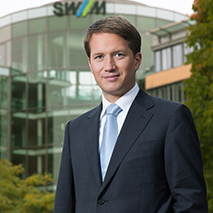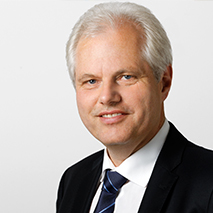Auctions for power from renewables. Do they make sense for municipal utilities?
Read two answers to this question, one by Dr Florian Bieberbach, CEO of Stadtwerke München (Munich municipal utilities), and the other by Ortwin Wiebecke, spokesman of the board of Stadtwerke Tübingen (Tübingen municipal utilities).
FOR: Dr Florian Bieberbach
 © SWM/ Martin Hangen
© SWM/ Martin Hangen
Yes, indeed, auctions for power from renewables do make sense for municipal utilities. For years, I've been advocating that the roll-out of renewables and the necessary extension of the grids should go hand in hand and follow an approach that makes sense economically. Now that the Renewable Energy Sources Act has been in force for almost 15 years and that we have seen substantial progress as far as both the technology side of things and professional risk management for projects in the renewable energy sector are concerned, there is a focus on market integration.
The upcoming auctions mark the point at which renewables take the necessary step to become viable on the market. Market integration is about submitting yourself to the basic principle underpinning all well-functioning markets, the principle of supply-and-demand. In this case, demand stems from the political will to incrementally increase the share of renewables in electricity generation so as to help mitigate climate change. Now the intention is for this demand to be increasingly met in line with market-based principles, which of course means that there must be competition. The auctions create competition by ensuring that the contract is awarded to the supply whose offer is the most efficient in economic terms.
The procedure has a twofold effect: first of all, it ensures that funding is allocated in a more effective way, i.e. that the speed of the extension becomes more steerable. Second, the procedure will also be more efficient. This means that the renewables target set out by government can be achieved at a lower cost to the overall economy. Ultimately, this greater efficiency will be reflected in a lower renewable energy surcharge, meaning that electricity users benefit from lower power bills.
Replacing the rigid system based on fixed feed-in tariffs that existed under the 'old' Renewable Energy Sources Act with a system based on auctions makes good sense and allows for the energy transition to be affordable and more manageable. Keeping the energy transition affordable is vital if you want to retain public backing for renewables and ensure that businesses don't lose their competitive edge. For all these reasons, the auctions make good sense, including for municipal utilities.
Dr Florian Bieberbach is CEO of Stadtwerke München (Munich municipal utilities).
AGAINST: Ortwin Wiebecke
 © swt/ Jens Klatt
© swt/ Jens Klatt
I can't help feeling that the auction design is a Trojan horse that is being sold under the pretext of wanting to reduce costs but is really about slowing down the energy transition and putting up market barriers that will make it difficult for small companies to enter the market.
If the deployment corridors are narrowed down as planned, this will slow down the roll-out of wind power along with the roll-out of renewables as a whole, and quite drastically so. Given that repowering potential is included in the deployment corridors, which are too slim as it is, we must expect that whatever capacity will still be added will be concentrated in areas where there is no need for additional electricity, namely a few sites in a handful of regions in Northern Germany where there is a great deal of wind. The extension process in the South, however, will grind to a near halt. Furthermore, the auction process is highly complex and associated with substantial risks.
All this may not be much of a problem for large energy companies or international investors. But for small and medium-sized companies it means that their chances of gaining a foothold on the renewables market have diminished quite considerably.
For the majority of municipal utilities, this can't be something that is in their best interest. On the contrary. What we really need is a procedure that allows for the market for renewable energy to be developed in a broad-based and decentralised way. A procedure in which small and medium-sized municipal utilities across Germany can get involved and that makes sense for them. This is not the case with this auction model, at least not in its current form. There is substantial need for adjustment: the deployment targets need to be raised, the location of the centres of consumption, which are in the South of Germany, needs to be taken into account as decisions are made about new projects to be built, and the requirements for participation must be eased – unless you want to exclude a large share of market participants.
Ortwin Wiebecke is Commercial Director and spokesperson for the Board of Directors of Stadtwerke Tübingen (Tübingen municipal utilities).
How will the funding for electricity from renewables be organised in the future?
How will the funding for electricity from renewables be organised in the future? In mid-February, the Federal Ministry for Economic Affairs and Energy tabled a new version of a paper (in German only) detailing the key principles that could underpin the 2016 amendment of the Renewable Energy Sources Act. Among the specific proposals listed in this paper is one on increasing diversity of players. For more detailed information read the lead article of the last fortnight's edition of the newsletter: "Renewable energy - levelling the playing field".

